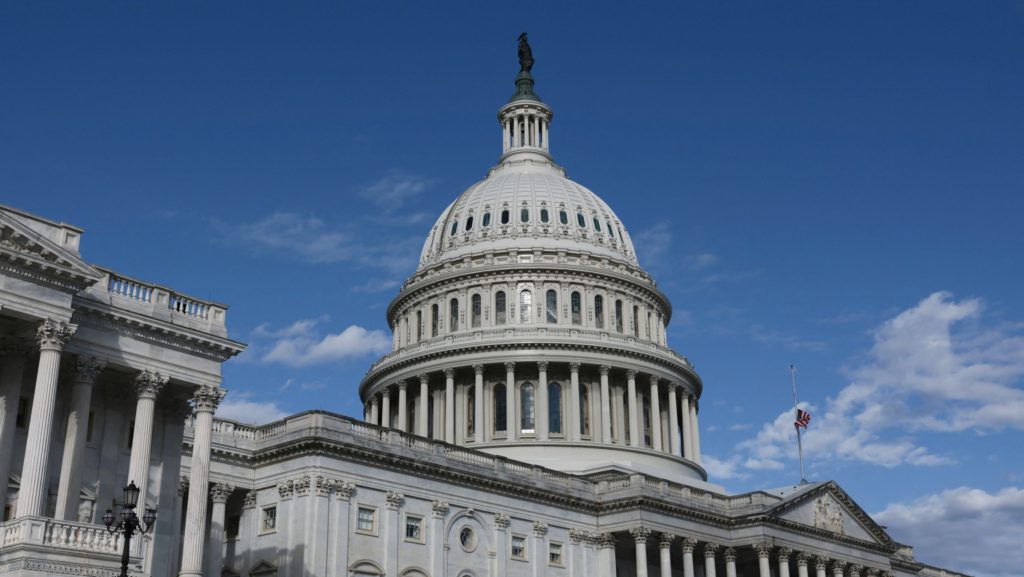A key procedural vote in the Senate signaled the beginning of a funding deal that may bring about the end of the longest federal government shutdown in U.S. history. But Catholic groups expressed concerns that the potential deal leaves the matter of health insurance subsidies to a future vote with an uncertain outcome and just as premiums are skyrocketing.
The Senate voted 60-40 late Nov. 9 to advance the House-passed stopgap funding legislation, which lawmakers indicated they will use as a vehicle for a funding deal. The potential deal would involve three full-year appropriations bills to fund certain departments through the end of the fiscal year, including the U.S. Department of Agriculture which manages the Supplemental Nutrition Assistance Program. SNAP is a major part of the nation's social safety net that provides food support for 42 million Americans and has already been disrupted under the shutdown. A continuing resolution would then fund the rest of the government at status-quo spending levels through Jan. 30.
"After 40 long days, I'm hopeful we can bring this shutdown to an end," Senate Majority Leader John Thune, R-S.D., said in remarks on the floor shortly before the vote.
Republicans and Democrats previously reached a stalemate in October over the subsidies under the Affordable Care Act, former President Barack Obama's health care law also known as "Obamacare." The subsidies, or tax credits, are used by lower-to-middle-income households to reduce their out-of-pocket costs for enrolling in the program. It is set to expire soon, and Democrats are seeking an extension.

Health policy researcher KFF published an analysis Sept. 30 showing ACA marketplace premiums are expected to spike an average of 114% in 2026 for those relying on subsidies unless they are extended. A family of four with a household income of $40,000 is expected to pay $840 more annually, while a family of four with a household income of $110,000 is expected to pay more than $3,200.
KFF found approximately 24.3 million Americans access health care through the ACA marketplace, and almost 22.4 million Americans receive subsidies in the form of advanced premium tax credits.
"Democrats have wanted to lower costs," Senate Minority Leader Chuck Schumer, D-N.Y., said in his own remarks on the floor Nov. 9. "But Republicans have fought us every step of the way. We gave Republicans not one, not two, but three chances this year to extend the ACA premium tax credits. Republicans said no every time."
Lucas Swanepoel, senior director of government relations at Catholic Health Association of the United States, told OSV News, "We are glad that members of Congress are beginning to discuss a path to reopen the government and ensure critical safety net and government programs for those who need them most. However, if extending the enhanced premium tax credits is not included in the final agreement, Congress's work is not done."
"Open enrollment is already underway, and families across the country are experiencing real sticker shock as they shop for coverage," Swanepoel said. "For households already stretched thin by rising costs in food, housing and the cost of living, dramatically higher health care premiums mean millions of Americans will face the real choice of deciding whether to buy health care coverage or food to feed their families. As Catholic health care providers, this is not a choice that any person should have to make."
A substantial number of Catholic households are affected by the government shutdown and rising health care costs pricing out families. Updated Pew Research data released in 2025 found 36% of Catholic households make under $50,000, including 18% making under $30,000.
The federal poverty line for a family of four in the U.S. is $32,150 in 2025.
The Senate deal was met with pushback among Schumer's party as the subsidies were a key part of the Democrats' position about funding bills. Sen. Bernie Sanders, I-Vt., an independent who caucuses with Democrats, called it "a very bad night" in a video posted on social media.
Laurie Carafone, executive director of Network, a Catholic social justice advocacy group, said in a Nov. 10 statement, "The American people are worried for good reason: without the extension of the ACA health care premium subsidies, millions of people will lose their health insurance, and it is projected 50,000 people will die every year."
A letter from public health and policy researchers at Yale University and the University of Pennsylvania issued earlier this year warned that 51,000 Americans annually could die as a result of disenrolling from Medicaid and the Affordable Health Care marketplace, cuts to nursing home staffing rules, and the expiration of the enhanced ACA premium tax credits.
A policy brief from the Center on Budget and Policy Priorities from Aug. 27 detailed the non-partisan Congressional Budget Office's findings that as many as 15 million Americans will lose health coverage by 2034 due to $1.1 trillion in cuts to Medicaid and ACA marketplaces from the One Big Beautiful Bill Act enacted by Congress this year and the expected expiration of ACA premium subsidies.
Swanepoel added, "Health care is a fundamental human right -- not a privilege reserved for the few. Our leaders have a responsibility to ensure that every person has access to affordable, reliable coverage. Extending these tax credits isn't just a necessary step -- it's a vital safeguard for millions of families who depend on stable, affordable health care."
Teaching set out by the U.S. Catholic bishops in their 1993 "Framework for Comprehensive Healthcare Reform" declared that "every person has a right to adequate health care. This right flows from the sanctity of human life and the dignity that belongs to all human persons who are made in the image and likeness of God."
Catholic leaders and ministries have expressed concern about other aspects of the government shutdown that affects the vulnerable, notably the lapse in SNAP federal food assistance, which 1 in 8 Americans rely on.
Archbishop Timothy P. Broglio of the U.S. Archdiocese for the Military Services, president of the U.S. Conference of Catholic Bishops, said in a statement released late Oct. 28 the bishops are "deeply alarmed that essential programs that support the common good, such as SNAP, may be interrupted."
Catholic Charities USA, the network organization dedicated to carrying out the domestic humanitarian work of the Catholic Church in the United States, recently announced a national fundraising effort to provide an emergency supply of food to Catholic Charities agencies around the country.
Carafone added, "It is our government's moral obligation to make sure Americans can eat, work, and access health care in this, the world's richest nation."

